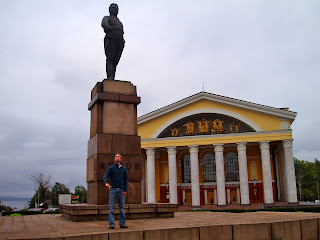If all
Russia’s superstitions were true I think someone you knew would die almost
every day, you would be constantly arguing and almost constantly afflicted by
bad luck! We discussed some today and I decided to share some. It makes a
change from the political musings which have come to dominate my blog.
I came
across one yesterday evening. I left my mobile phone at my friend’s house and,
having gone down five flights of stairs (the lift, which stops at the fourth
and sixth floors conveniently skips the fifth) I remembered and faced the
stairs again. When I got back to the flat, I wasn’t allowed to just take the
phone and disappear into the night. If I did so, something terrible would
surely happen. It was absolutely essential that I smiled in the mirror before
leaving. I objected – I didn’t want to take my boots off (and going into a
Russian home with shoes on is NELZYA
– forbidden), and anyway, I’ve had to come back for forgotten things hundreds
of times without smiling in a mirror, and disaster hasn’t struck yet. However,
I wasn’t allowed to ‘risk it’ – a pocket mirror was found, I put on my broadest
smile and headed out the door, ready for anything!
Another
superstition related to coming and going is that you mustn’t greet or say
goodbye to someone across the threshold of their home. That means you’re sure
to argue. Spilling salt also guarantees an argument. There are plenty of money
related beliefs. Whistling indoors is a no-no. It will lead to poverty. Leaving
empty bottles on the table is also asking for trouble – you’ll be out of money.
And after dark take care not to put money in someone’s hand. If an exchange is
necessary, put the money down and let them pick it up. Something positive which
may come from this is the little money tray in every shop. This means that when
you receive coins and notes as change you can pick them up separately out of
the tray, instead of struggling to put the coins into the coin section of your
wallet while holding onto your notes and receipt, a challenge I’ve still not
worked out how to deal with in England!
If you’re
hoping to get married any time soon, you’d better not sit at the corner of a
table. For 7 years you won’t find some to tie the knot with. If you are in a
relationship, make sure you don’t give your other half an even number of
flowers. Someone will surely die!
It’s a good
idea for students to put their textbook under their pillow the night before an
exam. Apparently information will just stream in to your brain. But be careful
not to wash your hair in the morning – because you’ll wash it all out again!
On top of
these, Russians also worry about lots of the things we worry about. If a black
cat runs across the road in front of you, you’d better pull over and let
someone else be the next person to drive past. The 13th is an
unlucky day, especially in May. In fact, May is a generally unlucky month (even
though that’s when they won the Great Patriotic War (WWII)), because it is part
of the word mayatsya, to suffer. It’s
not only bad luck to walk under a ladder – anything which leans against
something else is better avoided.
And there
are plenty more – enough to justify a whole website (in Russian). You might
have noticed that there isn’t much good luck going round, but fear not! It can
be found! Trolleybus tickets all have a chain of 6 numbers of them. If the
first 3 numbers add up to the same amount as the second 3 then you have to eat
your ticket and you’re sure to be lucky! It’s probably easier to find than a
four leafed clover, but I’m yet to find my lucky ticket…





















